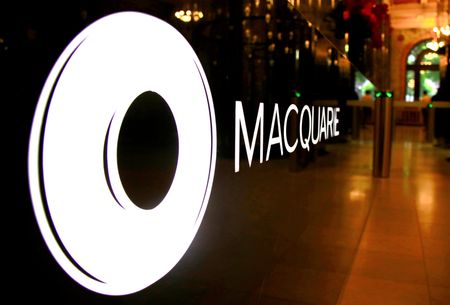
By Byron Kaye and Indranil Sarkar
(Reuters) – Australian investment bank Macquarie Group flagged a higher quarterly profit on Thursday and said all its business units felt the headwinds of inflation and market volatility but its diversified structure would still bring opportunities.
Macquarie did not give first-quarter profit numbers and said trading conditions had deteriorated but its exposure to volatile energy markets and unlisted infrastructure – which came with built-in “inflation protection” – may create a buffer.
Investors cheered the bank’s resilience, sending its shares higher.
The limited trading update that did not include forecasts and came ahead of its annual meeting later in the day underscores Macquarie’s record of defying economic turbulence with a diversified global operation that enables it to keep generating bumper profit.
Macquarie makes money by owning infrastructure like roads and utilities, trading commodities including oil and gas, running capital raisings for other companies and, in its home country, selling home loans. All divisions grew profit in the three months to June, the company said.
“While some areas will be negatively impacted by the macroeconomic environment, others will be able to respond with solutions,” CEO Shemara Wikramanayake told journalists before the meeting.
Shares of Macquarie rose as much as 3% in morning trading, helping push the broader Australian market up 0.6%.
“The commentary around the divisional performance in (the June quarter) speaks to the diversification of the franchise and resilience of the group’s earnings base,” said UBS analyst John Storey in a client note. “The impacts of a softening operating backdrop have yet to be seen in their financial performance.”
CEO Wikramanayake said Macquarie was exposed to a decline of one-fifth in Northern Hemisphere equity markets since the start of 2022, while central bank decisions to hike interest rates to curb inflation meant capital raisings were “substantially down”.
But the company’s infrastructure assets were “typically … able to capture the inflation aspect in the revenue line”, meaning they could make up for rising costs by putting up prices, she said.
In Australia, persistent high inflation has prompted many economists to forecast that the Reserve Bank of Australia (RBA) will deliver continuous interest rate increases for months, risking recession.
Wikramanayake said Australia’s inflation appeared to be “a bit behind the rest of the world” but “even the central bank is waiting to see, and being data-driven, in terms of what’s coming”.
Macquarie’s new chair, Glenn Stevens, a former RBA governor, added that “the truth is that we need to be alert to the risk of recession”.
(Reporting by Indranil Sarkar in Bengaluru; Editing by Anil D’Silva and Muralikumar Anantharaman)

